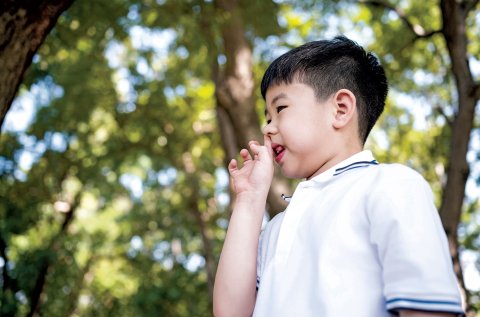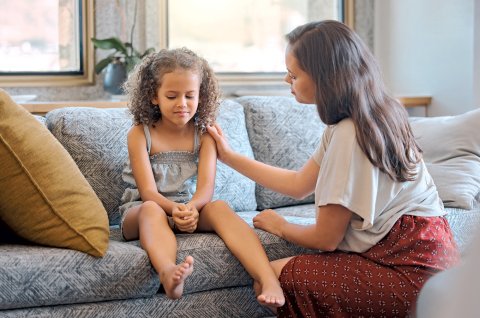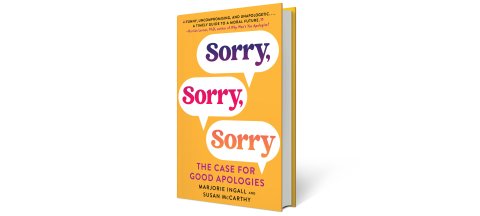Apologies are fundamental to a civilized society. Yet so many of us get them so wrong when we try to say "sorry"—or don't even apologize at all. But why? Why is it so hard to apologize? And to do it well? SorryWatch.com founders Marjorie Ingall and Susan McCarthy have been tracking and analyzing good and bad apologies for the last decade, and in their entertaining new book Sorry, Sorry, Sorry (Gallery Books), they unwind the baggage behind bad apologies and share the secrets of how to make a good one. In this excerpt from their book, they delve into teaching kids to apologize well—with lessons that apply to people of all ages.

Apologies from little kids can be so charming, touching, and funny, and SorryWatch adores their apology notes.
Take Riley here:
dear ciara
I'm sorry I chased you with a booger on my finger
i put it here so you can get me back
love Riley.
This is an excellent apology. Riley uses the word "sorry," apologizes to Ciara rather than to the public or a third party and makes amends by providing a payback opportunity. Notice how Riley did not write "dear ms johnson I regret if I disturbed the class love Riley." There's no "if." Riley knows the booger chasing was wrong and does not pretend it wasn't. And Riley saved that booger for Ciara. Now that's restitution. We like to think that Ciara will not get Riley back with the booger, because she's better than that. But she clearly has permission.
Here is another excellent apology, this one from a young fellow named Jack.
This Ben and Jerry's card is for the People who cleaned up the throwup of a kid on Friday the 28th.
I don't know their names but I thank them alot and I'm sorry again for throwing up. And hope you enjoy your Ice cream.
From Jack. AKA the kid that puked right next to the bathroom
Again, the kid in question states precisely what he's apologizing for (he's sorry for his puke, not for "the puke that occurred," or for "the regrettable vomnado situation"). He shows he understands the impact (someone had to clean up his mouthpoop) and he tries to make amends. It's particularly lovely that Jack wants to atone for something he clearly couldn't help; the location of the hurl indicates that in all probability he was heading for the bathroom and didn't quite make it.

Does it matter if Jack's parents rather than Jack paid for the Ben & Jerry's card or told Jack to write the letter? It does not. Jack wrote the letter. The letter is clearly in Jack's own words. Applause for Jack's parents for handling this perfectly. Parents understand that vomit happens. It is not a joy, but it is a price we pay for life on this earth. It can happen anywhere. (Disneyland and Walt Disney World used to use "protein spill" as code for "vomit or other bodily fluid requiring cleanup"; the current term is supposedly "Code V." You're welcome.) Cleaning up vomit is never fun, especially when the vomit did not come from your child, so a gift card is a nice gesture and an apology is essential. Through diligent research, SorryWatch has learned that Jack's regurgitation situation occurred at Powell's Books in Portland, Oregon, and that the apology arrived via U.S. mail in an envelope addressed to "Attention Barf Cleaners." (SorryWatch is good at forensic apology work.) Bravo for Jack, bravo for the good humor shown by the Powell's employee who shared this online, and bravo for whatever role Jack's parents played in this saga.
How to Do It Right
How do you become the kind of parent, grandparent or guardian who raises a Riley or a Jack? How can you help create a culture that values good apologies?
When we teach kids to apologize, we need to remember that apologizing is an act that is not intrinsically fun. If you don't remember that, the kid will probably remind you. Isolate the act of apology from bad things. Keep it separate from lectures and punishment, and praise the child for doing it, even if you had to drag it out of them. Truthfully tell them that they've now done something many adults are too...immature, or whatever . . . to do. Tell them apologies are acts of strength, because they are. Tell them you understand how difficult this is, because you do. (Later, you can perhaps share a story of your own difficulties apologizing. Back when you were a child yourself and clung to "Kenny did it" or, um, last week, when you rolled your eyes during the staff meeting. Because Jordan's comment was really, really stupid. But you should have kept the eye roll on the inside of your brain, not on the outside of your face. Because Jordan saw it and called you on it, after which you should not have said, "I did not," when you absolutely, totally did. And you should have privately apologized to Jordan after the meeting instead of avoiding Jordan for days.)
And just as with bad apologies, examples are powerful. You need to walk the walk yourself. Let your kid see and hear you apologize to them, to your spouse, to the waitress, to the friend you interrupted mid-story, to the cat when you tripped over him, to Kenny. If kids grow up around people who apologize when appropriate, apologizing won't seem like some mysterious torture you dreamed up BECAUSE YOU'RE MEAN AND YOU HATE THEM.

I'm Just a Soul Whose Intentions Are Good
Kids often have a very hard time understanding that "I didn't MEAN to!" isn't a free pass. They still have to apologize for breaking the window, stepping on someone's hand, or spilling the entire container of homemade mango kombucha—in the living room, where IT'S NOT EVEN SUPPOSED TO BE. They may also have to put their birthday money toward fixing the window and learn how to clean up kombucha in the living room.
Kids often need reassurance that adults understand that they didn't intend those things to happen. But the things did happen. And the kids still have to do their best to make things right again.
It's as if there were two offenses: breaking the window, and planning to break the window. Kids who didn't plan to break the window focus on the fact that they didn't plan to break it, and not the fact that they did break it. It's especially upsetting for kids who were trying to do good things—show another kid how to hit a fungo, demonstrate a new dance move, cheer a sibling up on a rainy day with an impromptu picnic (in the living room, where kombucha is NEVER supposed to be).
You know, maybe it's not that it's harder for kids to understand that "I didn't mean to" doesn't get you out of jail free. Maybe it's just that adults have more sophisticated ways of saying, "I didn't mean to." Like saying, "My remarks were taken out of context!" "It was not my intent to offend anyone!" "My friends know I'm not homophobic!" "My comedy is being censored by social justice warriors!" (To quote the kid in the vintage Partnership for a Drug-Free America ad, "I learned it by watching you!")
'Do You Have Prince Albert in a Can?'
When teaching kids to apologize, there may need to be more emphasis on understanding why an apology is called for, because kids are young and they don't know everything yet. In our lives, we learn things at different rates. Apology lessons have to be age-appropriate, and they shouldn't assume kids already know things they have no way of knowing. It's the parents' job to make the why something is wrong clear to them.
Here is an example of a British child whose parents did that, and the fact that they did is clear in the kid's apology. (The British child pranked 999, which is the emergency services number in the UK. Prank calls are very tempting, even if kids today do not understand why Prince Albert was in the can or why they should let him out.)
To ever it concers I pressed 999 and I am so so sorry. Why I should not press 999 only if it's an emensey.
1. Because you will get a fine
2. You will get really told off by the people on the phone
3. It could stop someone else that needs help
I so sorry and I under stand how serius it was, I promise that I will never ever do it again. I am very, very sorry.
We don't know whether the East Midlands Ambulance Service responded to the child or whether they merely tweeted the letter. (Ah, social media.) Apologies should not be about getting caught and dutifully muttering, "I'm sorry." It's on parents to explain why the thing the kid is apologizing for was wrong, how the kid's actions affected others and how we want society to function. Yes, that's important.
But remember, no one has to forgive. Teach your kid not to follow up an apology with "We're good, right?" They have to be gracious if they've wronged someone, but the other kid is under no obligation to accept their apology and shouldn't be asked to do so. If your kid is on the receiving end of an apology, ask them not whether they were wronged but whether they think the apology was sincere. If the other kid screwed up but is willing to own that fact, teaching your kid to hang on to resentments isn't doing them any favors. When Jordan left his backpack in the aisle after being told that backpacks do not belong in the aisle, and your kid trips and Jordan apologizes and actually seems to understand that leaving the backpack in the aisle was wrong and caused pain, your kid should be encouraged to accept the apology and move on.
Teaching your kid to recognize gaslighting, on the other hand, is a valuable skill to take into adulthood. When Jordan deliberately tripped your kid and then said, "Sorry but it was an accident and I thought you saw my leg sticking out and you should really be more careful," your kid is under no obligation to accept that apology.
Maybe start with teaching your kid to say, "Thank you for the apology." And no more. Those words don't mean "I forgive you." And if the other kid is a cretin, encourage your kid to stay away if possible and expand their friend circle. Mean girls and jerky boys often make themselves known very early on.
We All Thank You
Teaching children how to apologize well and how to accept apologies gracefully contributes to children's overall happiness and sense of security and helps make the world better. We hope your children—and ours—become good people and that goodness emanates from them all their days.
Six Apology Steps for Kids
1 _ Say "I'm sorry" or "I apologize." Luckily, little kids don't usually have the vocabulary to futz around with dodges like "What a pity that happened to Bodger's teddy bear. Sad!" and they should apologize to the person who was hurt or upset.
2_ For what they did. Specifically, "for calling you a big sucky liar," not "for calling you names."
3 _ Acknowledge the effect. "Barbie's never going to get those heels on again."
4 _ Explain why they did it. Optional. This may be hard for kids, who sometimes have no idea why they do things. Still: "I thought it would be funny if it was raining fruit punch, and I didn't realize you'd get sticky and have to take a bath and change your clothes."
Just be sure, as your kids get older, that they understand the difference between an explanation and an excuse. It's often better to avoid the former if the kid tends to start sliding into the latter.
5 _ Tell the person harmed why they're safe now. aka "I'll never do it again."
6 _ How will you make it up to them? "I'm going to help sew Bodger's legs back on." "You can have my Barbie." "Here's the booger. Feel free to chase me with it."

Adapted from Sorry, Sorry, Sorry, published by Gallery Books, a division of Simon & Schuster. Copyright © 2023 by Marjorie Ingall and Susan McCarthy.














